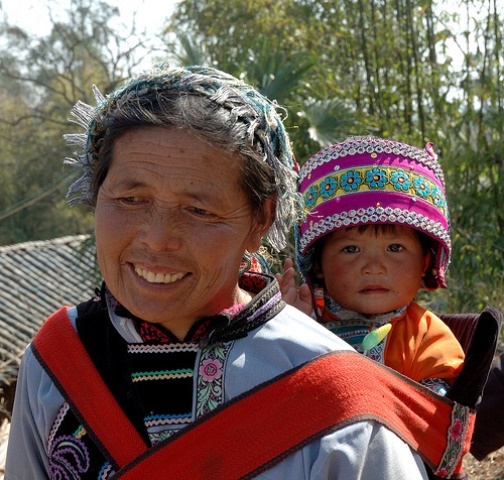ICDP developments began in 2015 and are still ongoing. Webpage: https://icdpchina.net/
ICDP China leader, Jean Qin shared an update in November 2023: “There are 2000 facilitators in Yunnan province, and they work in 5 project sites; each site has minimum of two trainers, some have up to 4 trainers. There are 20 trainers in total. The ICDP system of trainers supporting facilitators works very well in China, as trainers help motivate and maintain the work of facilitators in each project area and on the other hand, trainers themselves are provided support by ICDP China by travelling to meetings held in Kunming which are organized by ICDP China for that purpose. In addition, there are also direct meetings between ICDP China and facilitators, which are mainly online. But it is also aimed for facilitators to meet together in person, as a way of encouraging sharing and mutual support. The exchanges that take place at these meetings are very important to maintain enthusiasm and motivation at all levels. Outside Yunnan, ICDP China trainers have formed facilitators in two other areas, in the west and north. ICDP facilitators who work in these areas find it harder to meet as they tend to live far from each other and far from ICDP China. However, they receive online support from ICDP China online and occasionally through visits in person. ICDP with minority groups: In 2023, ICDP implementation was very successful with minority groups living in different parts of the Yunnan province. There are 10 minority groups and each group has its own dialect. Therefore, ICDP was adapted to meet these language needs. The facilitators met many family situations where parents leave their homes to find work, which is often only available far away from their villages and as a consequence, it is left to the grandmothers to bring up the children. For that reason, many grandmothers received ICDP training over the years. Facilitators found grandmothers receptive to the first dialogue, but they were a bit at a loss with the second dialogue – they felt that their own lack of education made it hard to mediate meaning.
Early developments:
The Women’s Federation (WF) is very committed about implementing ICDP in China. “The head found its pillow”, they said, meaning that ICDP fits in perfectly with their organizational aims.
WF is an organization with the responsibility of promoting human rights and developing services for the benefit of women and children throughout China. They are developing ICDP through their existing system, i.e. through their structures and by training personnel that operate at all levels of Chinese society, from national down to village level. WF also provides premises for the ICDP training, including accommodation at reduced rates.
Three ICDP pilot projects will be rolled out in Kunming, Zhaotong and Xishuangbanna. Kunming is the capital of the Yunnan province with many migrant workers; Zhaotong is a poor mountainous area with a large percentage of children who have been left behind by their parents in search of work; and Xishuangbanna has a population with more than 13 minority groups. The plan is to build on the experiences of the pilot projects in order to establish a system of ICDP delivery that can be used in the entire Yunnan province, and then be applied in other provinces as well.
The implementation of the ICDP programme in China is a major part of a project called “Breaking the circle of leaving children – to reduce the numbers of children that are left by their parents and to improve the quality of life for children”. This project will take place from 2015 to 2019 and it represents a cooperation between the Women`s Federation Zhaotong, the Xishuangbanna Legal Aid Centre and the Shincon Kunming Rep Office. It is supported by the Norwegian government development funds, with matching funds from the Women`s Federation.
The project hopes to contribute to the psycho-social development of children through interventions for their parents and caregivers. Parents’ awareness will be raised about the irreplaceable role they play in their children’s development and they will receive help to raise their children in a loving way by applying the three dialogues of the ICDP programme. The expected result is that parents after attending the ICDP training will know how to spend time with their children in a way that would positively effect their children’s development and will observe and report about changes in their children’s behaviour.
ICDP and the Shincon Kunming Rep Office signed an agreement for cooperation; ICDP will be providing international trainers and general consultancy for the duration of the project. The ICDP developments on the ground will be coordinated by a non-profit organization, whose board will have representatives from the WF Yunnan, the WF Zhaotong, the Xishuangbanna Legal Counseling Centre and the Shincon Kunming Rep Office.
TRAINING
In 2015, two groups of Chinese educators attended ICDP training that was held in Kunming. It was attended by forty five participants who will become ICDP facilitators.
The process of adapting materials to the local context is part of the pilot project, and this process has already started with the adaptation of the pictures and language. Some of the ICDP materials have already been translated and printed. These include: Part One of Karsten’s book; and some additional material prepared by Nicoletta Armstrong, such as the Tools for facilitators and trainers, the Booklet for caregivers “I am a person”, a Guide for trainers and the Photos for the 7 typical situations. The translation was made into Mandarin and checked through by a very competent team, including Gao Wanhong, professor and director of sociology and social work, at the school of public administration, Yunnan University and Ma Lijun, senior lecturer, who has been serving in the Yunnan women and children’s development center since 1990, and has cooperated as an adviser, trainer and curriculum expert with United Nations Children’s Fund, Save the Children UK, UK development department, Right to Play, among others.

